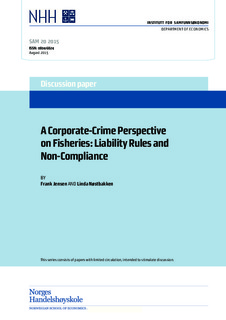| dc.description.abstract | The existing fisheries economics literature analyzes compliance problems by treating the
fishing firm as one cohesive unit, but in many cases, violations are committed by agents acting on behalf
of a firm. To account for this, we analyze the principal-agent relationship within the fishing firm. In the
case where the firm directly benefits from illegal fishing, the firm must induce its crew to violate
regulations through the incentive scheme. Within this framework, we analyze how the allocation of
liability between fishing firms and crew affects quota violations and the ability to design a socially
efficient fisheries policy. We show that without wage frictions, it does not matter whom is held liable.
However, under the commonly used share systems of remuneration, crew liability generally yields a
more efficient outcome than firm liability. Furthermore, asset restrictions may affect the outcome under
various liability rules. | nb_NO |
